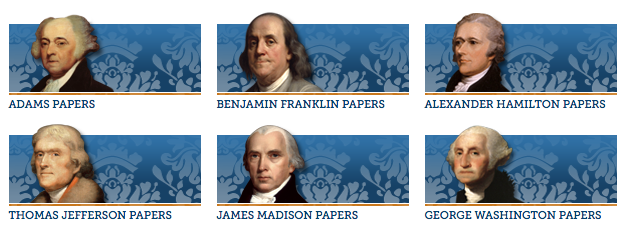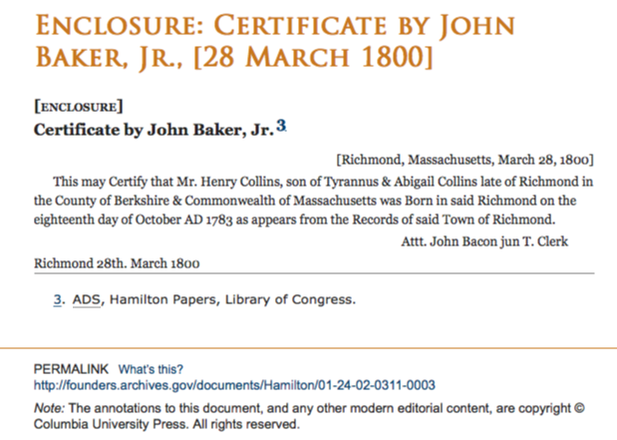The RecordsThe National Archives has partnered with the University of Virginia to make historical documents of the Founders of the United States of America free and available online. On the website Founders Online, you can search through thousands of digitized records from George Washington, Benjamin Franklin, Alexander Hamilton, John Adams, Thomas Jefferson, and James Madison. The site is continually being added to and will include over 178,000 documents relating to America's Founding Era when it is completed. To get started, there is a FAQ page "How to Use This Site" for tips on how to find, access, and research documents in the collection. Whether researching a person, time period, or a concept (e.g. Bill of Rights), you can find specific suggestions and helpful information there. The collection can be searched in several ways: by author, recipient, time period, or keyword. The documents are fully searchable and annotated. The Case StudyAs an example of how valuable this digital collection can be for genealogists, I will use a case where I was working on identifying the death date of a Revolutionary War patriot from New York. If you have ever worked with colonial era records, then you know it is often difficult (if not frustratingly impossible) to locate documents for an ancestor going back that far. Some states, and even towns within a state, were better than others at keeping track of vital records at that time. After exhausting town and church records search, the goal is to look next for other types of records that hold clues about that ancestor. In the case of my patriot, I needed to track his family's whereabouts after the Revolutionary War ended. What little I knew about him was that he was born and had married in Connecticut, and moved to the small frontier town of Ballston, New York when it was first settled. During the Revolution, he was taken prisoner by raiding Tory soldiers and held in Canada until the fall of 1782, when the last of the Patriot prisoners were released and sailed for home. Unfortunately for me, he did not go straight back to his farm in Ballston, NY. After the raid where he was taken prisoner, it was apparent that his wife and children had not remained in the town. They had probably fled to be near extended family or former neighbors in a safer place, but where?? At that early stage in my research, locating that unknown community was like finding a needle in a haystack. The ancestor's first name was unique ("Tyrannus") but also frequently misspelled in records, so using name variations and wildcard characters in searches could take a very long time. Last name was common ("Collins"), which would also return too many records during index searches to be productive either. When it comes to colonial research, as I have already mentioned, vital records can only be so helpful. Census records are the next go-to place, but the first U.S. census of householders are fraught with errors and omissions. Because the family didn't show up in the first 1790 U.S. federal census in either New York or Connecticut, I needed to strategize another way to get a handle on where they might have gone. The first stop was to look at early post-colonial era collections for general information that might pertain to the ancestor and his family. That is where the Founders Online collection came in. It truly was as simple as typing the ancestor's name "Tyrannus Collins" in the keyword search bar. Of course, we all know about serendipity, which isn't always on a researcher's side. But when it is..."Eureka!" moments like this are priceless: I not only found the town where the patriot had gone right after the war, I also confirmed that his youngest child was born there and that they had left town afterwards. I have since identified much more about the patriot's personal story up until his death and I owe it to this simple affidavit for helping knock down a brick wall that has made other researchers give up. Source: Founders Online. https://founders.archives.gov. 2017
1 Comment
Bruce Chute
2/28/2018 07:26:13 am
What a great story! I think that finding key pieces of information in unexpected places is one of the most rewarding and satisfying aspects of genealogical research. Congrats on the find!
Reply
Leave a Reply. |
AuthorBeth Finch McCarthy
|



